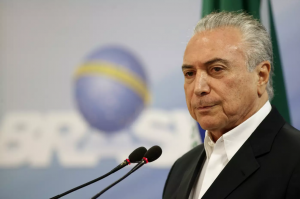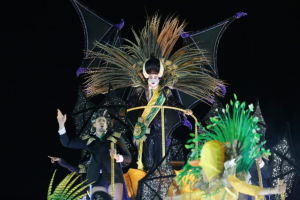The current President of Brazil, Michel Temer, suggested that he plans on running for a new term in this October’s election. Temer originally entered the office of the Presidency in 2016 after the impeachment of Dilma Rousseff. To this point, much of his presidency involves straddling corruption charges and attempting to pass economic reforms to fix, to use Temer’s words, “a country that was broken” from the heavy public spending of his predecessors. On corruption charges, Temer has avoided trial in the Supreme Court thus far. If he wins the election and continues in the office of the presidency, it may allow him to continue avoiding trial due to special legal privileges for high-ranking government officials.

Michel Temer responding to allegations of bribery in the Chamber of Deputies President Eduardo Cunha on May 20, 2017 in Brasilia, Brazil
In an interview with the newsmagazine Istoé, Temer claimed that he seeks to protect the legacy of his presidency, highlight his successes and the advancements of his administration, and to continue in the pursuit of economic reform. However, the same interview carries threads of the desire for a maintenance of power to protect himself from potential persecution by the other candidates and political opponents. Temer’s opposition is large, which is readily apparent in his single-digit polling numbers. Also, his opponents mainly lie on the left, as center-right Temer’s attempts at economic reform have changed labor laws and weakened the political power of unions and their members. Because of these polling numbers and Temer’s rampant unpopularity, running for office is a relatively safe option for him. That is, his approval is so low that his candidacy will not significantly damage those numbers, and if he, or one of his allies does win, he is likely to have some level of protection from previous charges of corruption.
This decision to run also occurs about a month after his decision to allow the military to control security in Rio de Janeiro, which was a calculated strategy to attempt to secure some political favorability. However, the effectiveness of this decision is debatable, as Temer’s approval rating is still extremely low and violence in Rio remains.

Vampire in Carnival 2018
Brazilian politics in this New York Times article are portrayed as consisting of corrupt politicians who use their positions and the tools of those offices (ie. the military) to pursue personal and political gains. It also shows the Brazilian public, at large, as dissenting and politically engaged, especially in art forms such as graffiti and samba. The article is suspicious of Temer’s motivations, not only due to corruption charges, but also because there is a disconnect between the rationale of decisions and the reality of their consequences. This disconnect is demonstrated in the author’s disapproval of the recent decision to allow the military to run Rio’s security due, in part, to the assassination of Marielle Franco. In discussing elections and presidents, this article relates to class conversations on political leadership and transfers of power in Brazil.
Main Article for the Blog Post:
Michel Temer, Brazil’s Deeply Unpopular President, Signals Run for a New Term
Articles for context and/or further reading:
Brazil’s Military Is Put in Charge of Security in Rio de Janeiro
President Temer of Brazil Faces New Corruption Charges
Killing of Rio de Janeiro Councilwoman Critical of Police Rattles Brazil
Upending Brazil’s Presidential Race, Court Upholds Ex-Leader’s Conviction
Photo: Carnival
Photo: Michel Temer May 20, 2017 in Brasilia, Brazil
http://time.com/4792665/brazil-michael-temer-corruption-scandal-lava-jato/
